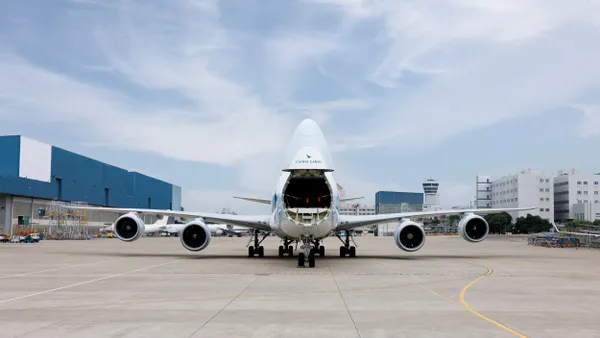Dive Brief:
- Raymond Martinez, President Donald Trump’s pick to head the Federal Motor Carrier Safety Administration (FMCSA), told a Senate panel he does not intend to delay the agency’s December 18 electronic logging device (ELD) if he is appointed, Overdrive reported Wednesday.
- Noting the objections of many, however, Mr. Martinez does wish to meet with independent owners regarding their concerns. He added that safety, not the inhibition of business, is the goal of the ELD mandate.
- Mr. Martinez also said he wishes to make the FMCSA more data-driven, and reform the agency's Compliance, Safety, Accountability program (CSA) as its carrier rating was closed to the public starting in 2015.
Dive Insight:
If confirmed, the next head of the FMCSA will have much on his plate as he attempts to navigate the trucking industry's conflicting feelings on the ELD mandate.
The new regulation would require all motor carriers to replace their paper logbooks with the new technology, beginning December 18, 2017. However, drivers have until April 2018 before the mandate is fully enforced, as the FMCSA seeks to find a way to phase in the mandate's impact.
To many in the industry, ELDs are a safety device rather than an inconvenience. Fleet drivers have already grown accustomed their presence, and cite the road safety benefits of increased hours-of-service compliance versus an uptick in heavy-duty vehicle accidents.
The ATA has already expressed its support for the ELD, and the FMCSA has granted some exemptions to carriers like UPS, demonstrating some flexibility for what it considers reasonable requests.
However, the Owner Operator Independent Driver's Association (OOIDA) remains unmoved by the ATA, the exemptions thus far, and the break-in period. "We still have many serious concerns, not the least of which is regarding the FMCSA’s refusal to certify any manufacturers’ devices, " Norita Taylor, spokesperson for the group told Supply Chain Dive. "It’s 'buyer beware' under a self-certification policy for a federally required device," she added. "We are also concerned about recent exemption requests and the government’s responses so far. They are not providing consistent answers in granting those requests and no indication how they will be enforced."
Yet, some within the ATA have even suggested that the OOIDA objects so strenuously to the rule because of the limitations it places on legal driving hours, rather than its expense or uneven enforcement.













